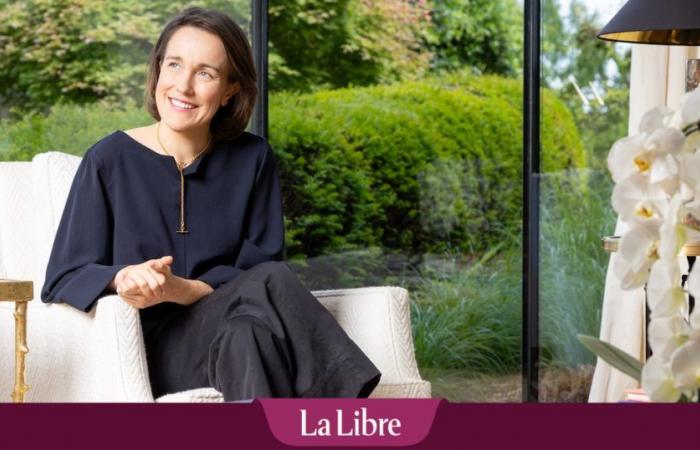
This is the first play written by Nicolas Godart. This talented 27-year-old artist, originally from Léglise, became known to the general public through his first major role in the mini-series “Anthracite” broadcast on Netflix. This 100% Belgian theatre project, directed by Clément Croiseaux, was presented at the beginning of June at the Fou Rire theatre in Ixelles. Author of this play, and actor who plays the son, Nicolas Godart sparkles in the clothes of his character who is at once uncontrollable, desperate, moving and powerful. The role of the sister is magnificently interpreted by another young Belgian actress, Lily Moreau.
The first scene opens with a monologue by actress Hélène d’Udekem, who plays a depressed and suicidal mother. This is the very first time that Hélène d’Udekem, a graduate of the Cours Florent, has taken to the stage, playing her very first unrestrained character. Completely disoriented, the mother in a nightgown loses her temper with her children, slumps in an armchair, curls up in a sheet and looks for her cat before eating its kibble. This unexpected scene quickly turns out to be as funny as it is tragic. The mixture of emotions is effective. For her first appearance on stage in public, Hélène d’Udekem impresses with her great presence, her vivacity and the emotions she shares.
Can Theatre Save Teens?
Throughout the play, the actors’ acting unanimously touches the audience with its naturalness. Nothing is labored, everything seems so natural. The only downside is two rather long and incidental scenes where the pets, a cat and a dog, share their vision of the family.
During the first performances in Ixelles, a handful of friends of Hélène d’Udekem met so as not to miss their friend’s big jump. They were impatient to finally see her on stage after so many years at Cours Florent and in workshops. “It had become the Loch Ness Monster, she often spoke of it, but we never saw it,” nYou will entrust one of them to us. His sister, Elisabeth d’Udekem, will admit to having already seen the play: “At Hélène’s request, I came to see her at the dress rehearsal to reassure her. She has always been very discreet about her passion for the theatre. I am very surprised to see her playing a depressive and suicidal character, when she is always enthusiastic, optimistic and excited in life. A real role of composition.”
How did your passion for theater begin?
Completely by chance. To be honest, I hated speaking in public, the very prospect paralyzed me. I have always admired those who had this ease. But, in 2018, a friend pushed me to take an internship at the Florent course in Brussels to learn how to overcome this fear. I met exceptional people there and realized to what extent texts and words could nourish us deep within ourselves.
And yet, here you are on the bill at the Avignon Festival…
The scene was immediately a revelation that has never left me since. Theater is an art which can bring many things and which must be encouraged among young people not only to overcome their shyness but also to learn to express their feelings, to work through their emotions. Given my character and my background, it’s a 180-degree turnaround. I absolutely did not take the Florent course with a theatrical perspective and even less with the ambition of going on stage. After my studies at Cours Florent, I stayed there as an assistant and then a teacher. Last term, I had the opportunity to organize a public reading workshop there around the book written by my friend the novelist Alia Cardyn “Jim’s Crossing”. This is a children’s novel that follows a teenager through cancer and his recovery. The theme of cancer is addressed in a luminous, absolutely non-dramatic way. This workshop was a great success and we will try to run it in schools, especially those which have a student affected by the disease.
Is this a subject that affects you personally?
Yes, but fortunately, all that is behind us. It allowed us to do all the work that needs to be done for pediatric oncology research. I also joined the board of directors of the Kick Cancer Foundation created by my friend Delphine Heenen who does exceptional work in this field.
What attracted you to theater?
I am always impressed by the conclusions that young people draw after a theatre workshop where they dare to expose themselves. They come away with greater self-confidence.
What are your expectations with “Rollekebol”?
Our troupe wants to bring people back to the theater. We therefore hope that the play works in Avignon, that it touches the public and that it speaks to people as it speaks to our entire team. Theater is a living art that touches people differently than the screens, through direct contact with the actors. We speak to them sincerely and directly. The theater offers this direct access, without a net. It turns out that every evening and every performance is unique.
What do you particularly like about this meeting?
I am a regular at the Avignon festival. I love its magical effervescence. It is possible to see 5 to 6 shows per day. There is as much choice as there are possibilities for meetings and inspiration. We jumped at the opportunity to go there with Rollekebol. This piece was built very quickly, it is perhaps not a reasonable project (laughs). Avignon was not an end in itself. We hope that the piece will bounce back elsewhere. But, one thing at a time.
“The Kiss of the Spider Woman” or love to counter the horror of prison
Your troop doesn’t have a name yet, but who does it bring together?
It is not yet fully formed, but the actors are students from the Florent course, the result of our meetings, even if no one comes from the same year. A troupe that brings together lots of talents, starting with the two actors who play my children, Nicolas Godart and Lily Moreau, but also François Hoffmann who plays my ex-husband, and Camille Malnory. There is a lot of kindness, generosity with the public and enough curiosity to never offer the same thing twice. For these actors, the stage is not a desire, but a need! As a teacher, this need is seen. This total commitment reminds me of that of certain athletes.
How would you describe the character you play?
I play the mother of a family in disarray. The main roles are played by the two children. The parents here illustrate above all the damage they have done to their children. What I liked about this role of the mother is the weight and the fog that falls on her when her children and her husband leave the house. She loses her footing and even has to be institutionalized. It is the portrait of a mother and a woman alone facing the void. There is a sacrificial side to having dedicated her whole life to her husband and her children.
You were a lawyer before this change of direction…
Indeed, I was first a lawyer and then a legal advisor in a financial holding company. And I ended up in the theater. I learned that nothing is predetermined in life. Everything can change. We must let ourselves be moved by encounters and carried by the vagaries of life. Ten years ago, I would never have imagined being on stage. I would have laughed, it was so not my intuition and nor my desire.
Your sister, Queen Mathilde, became a public figure overnight…
Let’s be honest, I could never have done what my sister does. I’m much too shy to always be in the light. At the time of my sister’s engagement and wedding, I was 19, but I hated the presence of cameras and the gaze of others, because I was not at all comfortable. I am full of admiration to see Mathilde’s natural ability to be at ease and reason in what she does, without impulse. She is a real family elder.
What do you remember about the days following Philippe and Mathilde’s engagement?
The great media coverage of my sister’s engagement forced me to stop brushing against walls. I no longer had a choice, I had to reach out to others, since many people no longer necessarily dared to come to me.
Did this episode confront you with media expectations?
Yes, and I was afraid of it. Shortly after the announcement of my sister Mathilde’s first pregnancy, I had the bad idea of picking up the landline at home. On the other end of the line was a journalist who wanted to get information and our reaction. I kept answering all his questions that I didn’t want to make any comment. I didn’t answer a single question, but the next day, in the newspaper, there was an interview with answers that I had never given. It wasn’t a fatality, but I found this procedure very surprising. It astounded me and made me very cautious about the press.
Since then, a lot of water has flowed under the bridge.
Indeed, the media pressure on the family focused on the engagement, the wedding and the birth of my niece Elisabeth. Fortunately, all that has calmed down.
Your husband, Nicolas Janssen, is a Walloon MP, also a high-profile position.
His responsibility does not require me to make public appearances, even local ones, but I try to support him as best I can. During the election campaign, I participated in the distribution of leaflets. The exercise is both pleasant and interesting, because we listen to people, their priorities, their annoyances and their commitments. I like hearing voters express themselves to elected officials. The exercise is simpler for me than for the person representing himself. This gives more distance. Helping your husband in his career is a fairly rare opportunity in professional life.





